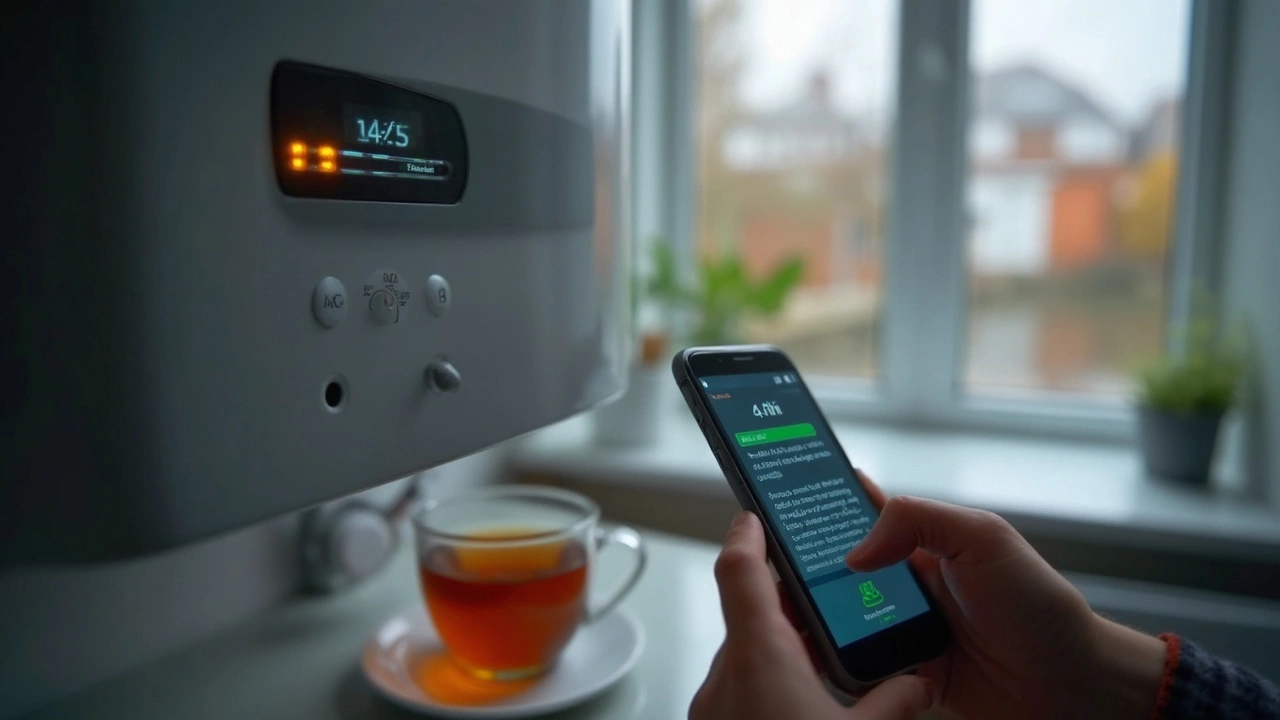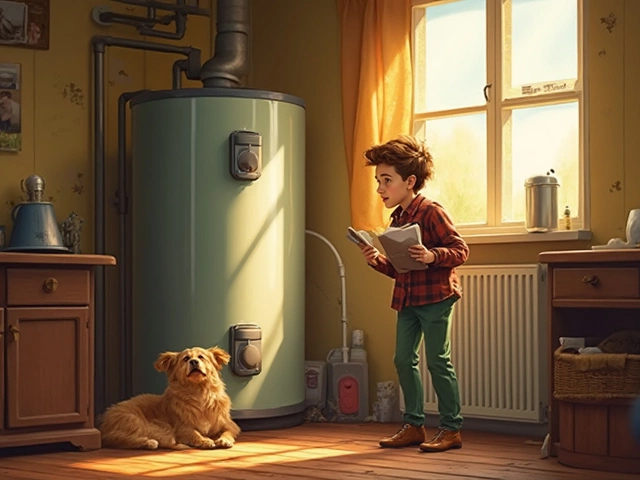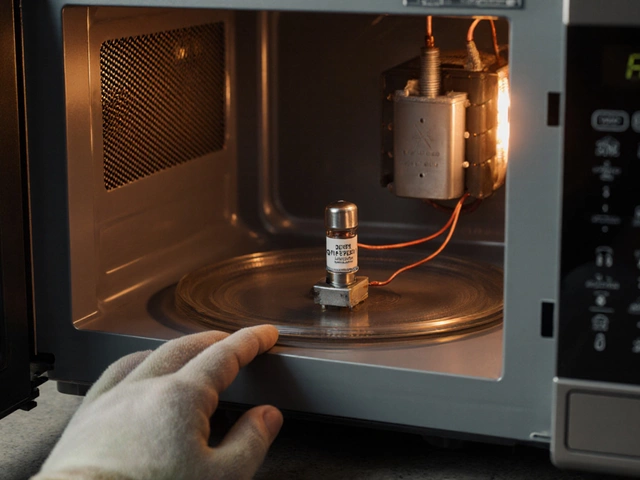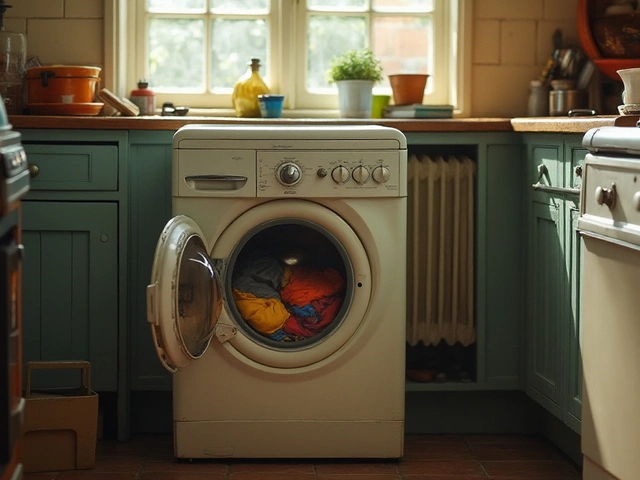Few things zap your comfort like a boiler acting up. If your heating suddenly feels patchy or you hear odd clunks from the utility room, your boiler may be waving a red flag. Spotting problems early isn’t just about staying warm—it can save you stress (and money) down the road.
First step? Notice what’s different. Did your radiators start getting ice-cold for no reason? Are there new leaks under the unit or does it sound like a mini steam train in your basement? These little cues can point straight to the sort of issue you’re facing. Trust me—boilers are rarely subtle when they’re in trouble.
Before you grab your phone to call a repair tech, take a good look and listen. A lot of boiler problems give off clear signs, from strange noises to digital error codes. Knowing what to spot doesn’t just help the pro—it gives you peace of mind, too.
- Common Signs Your Boiler’s in Trouble
- Listening and Looking: What Your Boiler Is Telling You
- Checking Boiler Pressure and Settings
- Understanding Error Codes and Control Panel Warnings
- DIY Checks: What’s Safe and What’s Not
- When to Call a Pro
Common Signs Your Boiler’s in Trouble
When you’re dealing with a boiler problem, some clues just jump out at you. The key is to notice the warning signs early before things get worse—or more expensive. Most boiler issues don’t fix themselves, and the longer you wait, the bigger the headache.
Here are some straight-up signals your boiler is in trouble:
- No Heat or Hot Water: If your taps run cold or radiators stay chilly even with the settings cranked up, your boiler probably isn’t doing its main job. This could mean anything from faulty thermostats to busted parts inside.
- Unusual Noises: Keep your ears peeled for banging, whistling, or gurgling sounds. ‘Kettling’—that boiling, whistling noise—usually points to limescale buildup. Banging could mean air or an issue with the pump.
- Pilot Light Keeps Going Out: Older boilers have a pilot light, and if it won’t stay lit, there could be a problem with the thermocouple or gas supply.
- Leaks and Drips: Pools of water around your boiler are a clear sign of trouble. It could be coming from failed seals or corrosion inside. Don’t ignore even small leaks—they can wreck the boiler and your walls or floors.
- Low Pressure: Most boilers have a pressure gauge. Low pressure (usually below 1 bar) means your heating won’t work right. You might get away with topping it up once, but if it keeps dropping, there’s a leak or another problem.
- Strange Smells: Boilers should never smell odd. Eggy or metallic smells might mean trouble with the gas or electrical circuits. If you notice a gas smell, leave the house and call the gas company—don’t mess around with this.
- Error Codes or Warning Lights: Modern boilers love to show off digital error codes. If something keeps popping up on the control panel, it’s your boiler asking for help.
The takeaway? Anything weird—be it sounds, leaks, loss of heat, or odd smells—means your boiler is trying to get your attention. Don’t ignore these early signs. Quick action can keep things from getting worse.
Listening and Looking: What Your Boiler Is Telling You
Your boiler isn’t going to flat-out tell you what's wrong, but it drops hints all the time. If you tune in to the sounds and sights, you’ll pick up on issues before they snowball into something major. A quick five-minute check now and then can help dodge bigger repair bills later.
Let’s break down the two easiest places to start: noise and appearance. Boilers should run pretty quietly. If yours is suddenly gurgling, banging, or whistling, something’s up. That ‘kettling’ noise (it really does sound like a kettle about to boil over) usually points to limescale build-up on the heat exchanger, and guess what? It can hurt your boiler’s lifespan if you ignore it.
Visual checks are just as revealing. Here’s what to look for:
- Boiler problem clues: Puddles or drips – Even a small leak is a big clue. Leaks can mean faulty seals, rust, or even damaged pipes.
- Corrosion – Rust patches on the outside or inside the unit should never be ignored. They can eat through metal and cause full breakdowns.
- Sooty stains – Soot marks around the boiler or flue are a sign of poor combustion. This isn’t just bad for your boiler, it can endanger your health.
- Flashing lights or warning indicators – Most modern boilers have little lights or a display that’ll flash if something’s wrong. Take this seriously.
Here’s a quick comparison of common boiler noises and what they usually mean:
| Noise | Possible Issue | Should I Worry? |
|---|---|---|
| Banging/Knocking | Air in the system, pressure problems, pump faults | Yes |
| Gurgling | Low water pressure, trapped air | Usually, yes |
| Whistling ('kettling') | Limescale on heat exchanger | Definitely |
| Clicking | Ignition issue or thermostat fault | Check it out |
Maybe you see condensation or steam coming from spots it never used to. Getting too hot to touch, or extra cold? Those are signals, too. Just because your boiler still fires up doesn’t mean all’s well.
Bottom line: your boiler will tell you a lot if you know what to watch and listen for. Take a minute in a quiet room. Open the boiler cupboard and just look at it running, especially if the symptoms show up more during winter’s harder work. Making sense of these early warnings can prevent a lot of hassle down the line.
Checking Boiler Pressure and Settings
Boiler pressure is one of the biggest tells when something’s not right. Most home boilers run best between 1 and 2 bars on the pressure gauge. If yours drops below 1, your radiators won’t heat up right. Anything over 2.5 bars? Not good—too much pressure can stress out seals and pipes, and you might get leaks.
It’s super easy to check. Just look for the small dial on the front of your boiler. Most even color-code it—green is good, red means either low or way too high. Here’s a quick rundown of what the numbers actually mean for a typical combi boiler:
| Pressure (Bar) | Status | What It Means |
|---|---|---|
| 0–0.5 | Too Low | Likely won’t fire up |
| 1–2 | Normal | Runs efficiently |
| 2.5+ | Too High | Risk of leaks, possible shutdown |
If the pressure is off, you’ll sometimes notice the error code pop up on the control panel, or weird banging noises as pipes struggle with too little or too much water. Topping up pressure usually means opening the filling loop—a small tap or lever on the boiler—until the needle gets back into the green zone. If you do need to let off pressure, bleeding a radiator is the easiest safe way.
Before adjusting anything, double-check your boiler’s manual. Different models sometimes have different sweet spots for pressure. And—quick safety tip—never mess with internal bits you’re not supposed to. If the gauge keeps dropping even after topping up, there’s probably a leak or a faulty pressure relief valve. That’s your cue to call a pro right away.
Also, while you’re at it, have a look at the timer and thermostat settings. Maybe the clock’s reset after a power cut or someone bumped the program settings. Small things like this can mess with your heating in big ways. If you need to reset, it’s usually a few button presses—nothing fancy.
Bottom line: checking the pressure and settings is usually step one for boiler problem troubleshooting. Do it before you spend money on a repair call.

Understanding Error Codes and Control Panel Warnings
Boilers have gotten way smarter over the years. These days, most units have a control panel right on the front, often with a digital display. When something goes wonky, the boiler throws out an error code. It’s just numbers or letters—sort of like your car’s check engine light—but a lot more specific.
Every boiler brand has its own set of error codes. For example, if you’ve got a Worcester Bosch, code EA usually means there’s an issue with ignition (it can’t light the burner). If it’s a Vaillant, F22 flashes when the water pressure has dropped too low. These codes aren’t random—they’re your boiler’s way of telling you what’s actually going wrong.
Here’s a quick table showing a few of the most common codes and what they really mean:
| Brand | Error Code | What It Means |
|---|---|---|
| Worcester Bosch | EA | Ignition failed |
| Ideal | L2 | Flame not detected |
| Vaillant | F22 | Low water pressure |
| Baxi | E133 | Gas supply problem |
If you don’t have the manual handy, you can always look up your model and the specific code online. Just type in something like “[Your Brand] boiler error code [Your Code]” and you’ll usually find what you need on the manufacturer’s site or boiler repair forums.
Don’t freak out if you see a code. Some are quick fixes (like topping off water if the pressure’s low). Others, especially ones about gas or ignition, really need a pro. Whatever you do, don’t start guessing or poking around inside the unit—it’s not worth the risk. Your boiler’s control panel is your first line of defense for diagnosing a boiler problem without having to take stuff apart.
DIY Checks: What’s Safe and What’s Not
Not every boiler problem needs a pro upfront—some things you can check yourself without risking safety or voiding warranties. Still, boilers aren’t like fixing a toaster. You need to know where to draw the line to avoid big headaches.
- Safe DIY Checks:
- Check the pressure gauge: Most modern boilers should sit between 1.0 and 2.0 bar when cool. If it’s low, topping it up (using the filling loop) is usually safe; just don’t overdo it.
- Bleed radiators: If your radiators are cold at the top but hot at the bottom, bleeding them with the right key can help move air out of the system and restore heat.
- Inspect for leaks or drips: Spotting water around the base or pipework? Take a photo. Tighten, but don’t force, any visible loose joints. Persistent leaks are a job for a pro.
- Check the thermostat: Sometimes the “problem” is a battery or programming glitch. Make sure your thermostat is working and set correctly.
- DIY Red Flags – Don’t Touch:
- Internal panels or covers: If you have to grab a screwdriver, stop. Internal controls and wiring are dangerous.
- Gas supply or smell: Ever smell gas? Don’t mess around—shut off the main supply, get outside, and call for help. Even a small whiff means leave it to the pros.
- Boiler electrics: Any electrical reset, loose wires, or faults on the display mean step back. Water and electrics are a bad mix.
- Major leaks or bursts: More than a drip? Soak towels around it, turn off the boiler, and call someone who knows their stuff. Flooding is nothing you should try to fix solo.
Knowing what’s okay and what’s not can literally be a life saver. Here’s a quick reference:
| Task | Safe For DIY? | Risks |
|---|---|---|
| Check/Top Up Pressure | Yes | Over-pressurizing system |
| Bleed Radiator | Yes | Minor water spillage |
| Open Boiler Panel | No | Electric shock, void warranty |
| Handle Gas Pipe | No | Explosion, carbon monoxide poisoning |
| Fix Wiring | No | Fire, electrocution |
Bottom line: stick to simple checks and quick fixes. Anything with gas or electrics? That’s professional territory, full stop.
When to Call a Pro
At some point, you hit a wall and DIY fixes just aren’t enough. Boilers seem simple until you start taking them apart—mistakes can get pricey or even dangerous. Here’s how to know it’s time for a professional.
- Boiler problem triggers error codes you can’t clear or understand. If the display flashes codes like “E133” or “F22” and your manual leaves you scratching your head, don’t try to guess.
- You spot a persistent water leak, especially directly from the boiler casing. That could mean internal damage or corrosion—big trouble if ignored.
- Gas or burning smells, or strange noises like banging or whistling, can mean unsafe conditions. Don’t risk it—turn off the boiler and make that call.
- Boiler won’t restart after resetting, or the pilot light goes out and refuses to relight. Safety locks often prevent bigger issues, but only a pro should investigate further.
"Any sign of a gas leak, or if your boiler loses pressure repeatedly, turn it off and call a Gas Safe engineer immediately. Don't take chances with your safety."—UK Gas Safe Register
Here’s a real eye-opener: according to the Gas Safe Register, over 1.1 million gas jobs in UK homes every year are carried out by illegal fitters—folks without the right licenses. Don’t add your place to that list.
| Boiler Issue | DIY Safe? | Pro Needed? |
|---|---|---|
| Resetting control panel | Yes | No |
| Fixing water leaks | No | Yes |
| Fixing gas leaks | No | Yes |
| Topping up pressure | Yes | No |
| Replacing internal parts | No | Yes |
Any repair involving gas, wiring, or opening the boiler case—leave it to someone certified. Not only is it often the law, but you’re also protecting your home and everyone in it.





